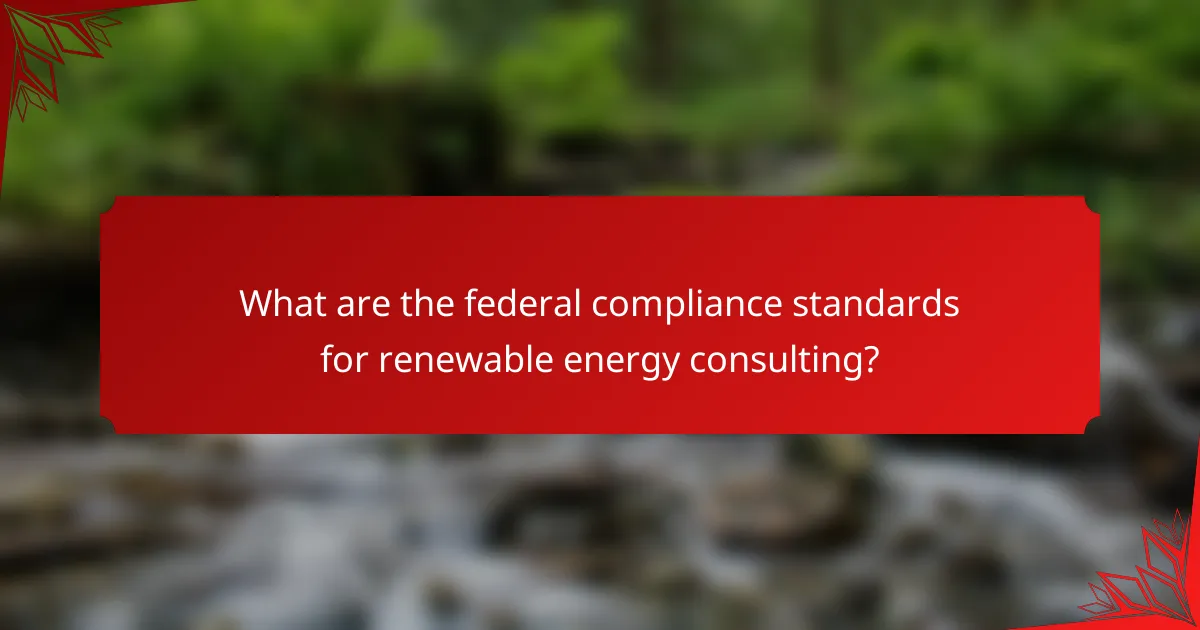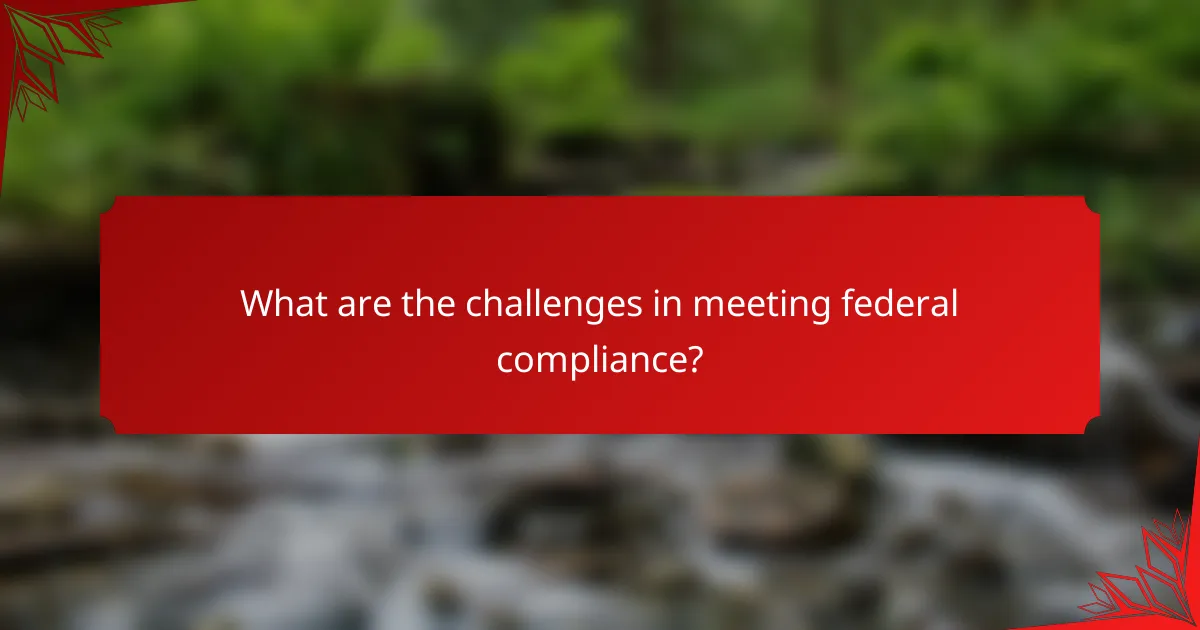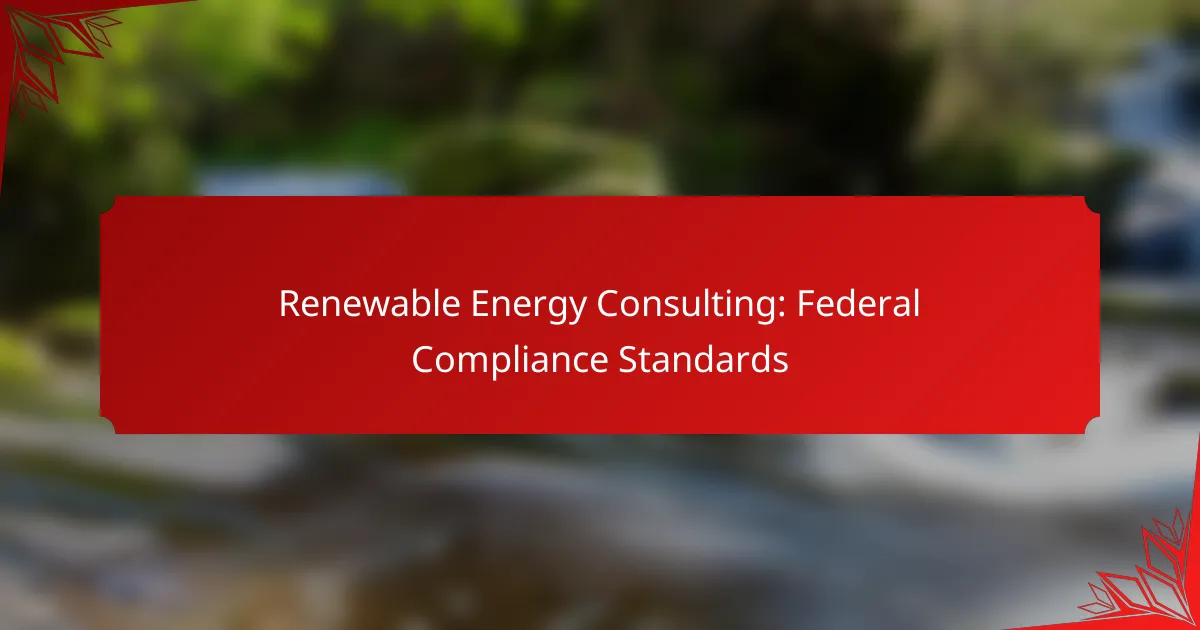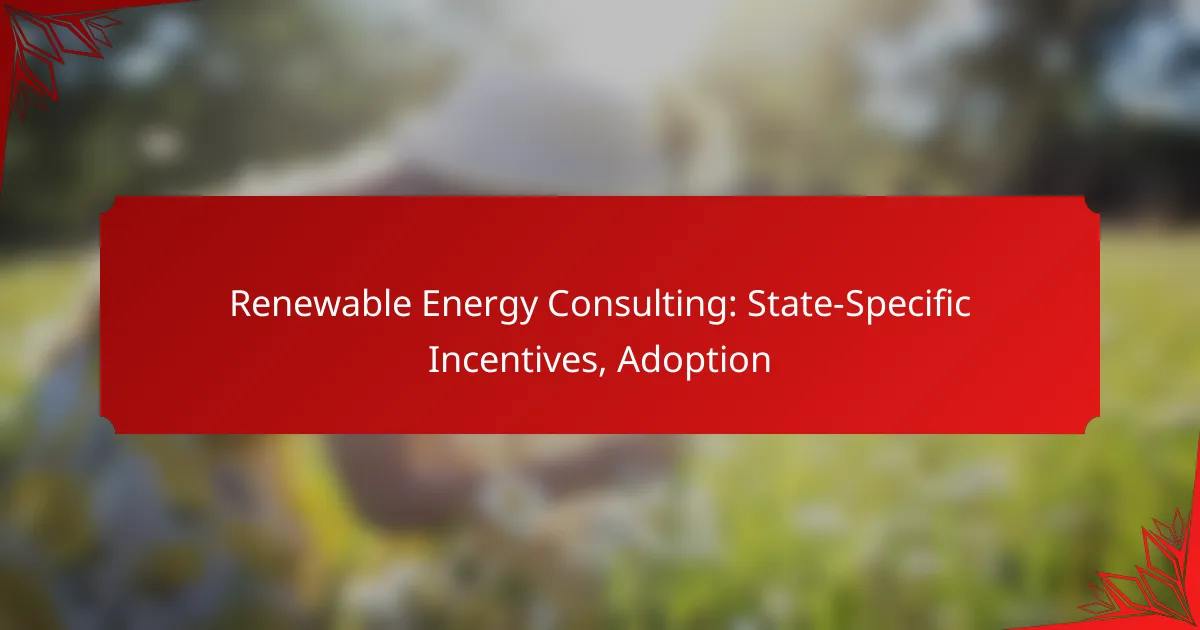Renewable energy consulting involves navigating federal compliance standards that are crucial for ensuring environmental protection and energy efficiency. By adhering to these regulations, consultants can help organizations align with legal requirements, promote sustainable practices, and access funding opportunities while minimizing legal risks.

What are the federal compliance standards for renewable energy consulting?
Federal compliance standards for renewable energy consulting encompass various regulations that ensure environmental protection and energy efficiency. These standards guide consultants in navigating legal requirements while promoting sustainable practices in energy projects.
National Environmental Policy Act (NEPA)
The National Environmental Policy Act (NEPA) mandates federal agencies to assess the environmental impacts of their proposed actions before making decisions. This includes preparing Environmental Assessments (EAs) or Environmental Impact Statements (EIS) for projects that significantly affect the environment.
Consultants must ensure that their projects comply with NEPA by conducting thorough environmental reviews. This process often involves public participation and can take several months, so early engagement is crucial to avoid delays.
Federal Energy Regulatory Commission (FERC) regulations
The Federal Energy Regulatory Commission (FERC) regulates the interstate transmission of electricity, natural gas, and oil. For renewable energy projects, FERC’s regulations ensure that energy markets operate fairly and efficiently, which is vital for project viability.
Consultants should familiarize themselves with FERC’s requirements, especially for projects involving hydroelectric power or interconnections with the grid. Compliance can involve submitting applications for permits and adhering to specific operational standards.
Clean Air Act compliance
The Clean Air Act sets standards for air quality and regulates emissions from various sources, including renewable energy facilities. Compliance with this act is essential for projects to minimize air pollution and protect public health.
Consultants should assess potential emissions and implement strategies to meet federal and state air quality standards. This may include using cleaner technologies or obtaining necessary permits for emissions, which can vary by state.
Energy Policy Act requirements
The Energy Policy Act establishes a framework for energy production and consumption, promoting renewable energy sources and energy efficiency. It includes provisions for tax incentives, grants, and loan guarantees for renewable energy projects.
Consultants should leverage the incentives provided by the Energy Policy Act to enhance project funding and feasibility. Understanding these requirements can help in securing financial support and ensuring compliance with federal energy goals.

How can renewable energy consultants ensure compliance?
Renewable energy consultants can ensure compliance by conducting thorough audits, staying updated with regulatory changes, and implementing best practices. These steps help organizations align with federal standards and avoid penalties while promoting sustainable practices.
Conducting thorough audits
Thorough audits are essential for identifying compliance gaps in renewable energy projects. Consultants should evaluate documentation, operational practices, and performance metrics against federal standards such as the National Environmental Policy Act (NEPA) and the Clean Air Act.
Regular audits can uncover areas needing improvement, such as emissions reporting or safety protocols. A checklist for audits might include verifying permits, assessing equipment efficiency, and reviewing stakeholder engagement processes.
Staying updated with regulatory changes
Regulatory landscapes for renewable energy are constantly evolving, making it crucial for consultants to stay informed. This includes monitoring updates from agencies like the Environmental Protection Agency (EPA) and the Department of Energy (DOE).
Consultants can subscribe to industry newsletters, attend relevant conferences, and participate in professional networks to receive timely information. Understanding changes in tax incentives or compliance deadlines can significantly impact project viability.
Implementing best practices
Implementing best practices involves adopting strategies that enhance compliance and operational efficiency. This includes developing a robust compliance management system that integrates regulatory requirements into daily operations.
Consultants should encourage the use of renewable energy technologies that meet or exceed federal standards, such as solar panels with high efficiency ratings or wind turbines with advanced safety features. Regular training for staff on compliance protocols can also mitigate risks and foster a culture of accountability.

What are the benefits of federal compliance in renewable energy?
Federal compliance in renewable energy offers significant advantages, including access to funding, enhanced credibility, and reduced legal risks. Adhering to established standards not only facilitates project approval but also strengthens stakeholder confidence.
Access to federal funding
Compliance with federal regulations opens doors to various funding opportunities, including grants and low-interest loans. Programs such as the Department of Energy’s Loan Programs Office provide financial support specifically for renewable energy projects that meet compliance standards.
To maximize funding potential, ensure your project aligns with federal guidelines and consider applying for incentives like the Investment Tax Credit (ITC) or the Production Tax Credit (PTC). These can significantly offset project costs and improve financial viability.
Enhanced project credibility
Meeting federal compliance standards enhances the credibility of renewable energy projects. Stakeholders, including investors and community members, are more likely to support initiatives that demonstrate adherence to recognized regulations.
Additionally, compliance can improve marketability. Projects that are certified or compliant with federal standards often attract more attention and can command higher prices in competitive bidding scenarios.
Reduced legal risks
Federal compliance helps mitigate legal risks associated with renewable energy projects. By adhering to established regulations, project developers can avoid potential fines, litigation, and project delays that arise from non-compliance.
It is crucial to stay informed about relevant laws and regulations, such as the National Environmental Policy Act (NEPA), which governs environmental assessments. Regular audits and compliance checks can further reduce the likelihood of legal issues arising during project execution.

What tools assist in compliance management?
Compliance management in renewable energy relies on various tools that streamline adherence to federal standards. These tools help organizations track regulations, manage documentation, and ensure that operations align with legal requirements.
EnergyCAP software
EnergyCAP is a comprehensive energy management software that assists organizations in tracking energy consumption and costs. It offers features for utility bill tracking, energy reporting, and compliance documentation, making it easier to meet federal regulations.
Users can automate data entry and reporting processes, which minimizes errors and saves time. EnergyCAP is particularly beneficial for organizations looking to analyze energy usage trends and identify areas for improvement.
Envirosuite platform
The Envirosuite platform focuses on environmental management and compliance monitoring. It provides tools for real-time data collection and analysis, which helps organizations stay compliant with environmental regulations.
With features like air quality monitoring and noise management, Envirosuite enables companies to address compliance issues proactively. This platform is ideal for industries that are heavily regulated and require constant monitoring of environmental impacts.
Compliance management systems
Compliance management systems (CMS) are designed to help organizations manage regulatory requirements effectively. These systems typically include modules for tracking compliance tasks, managing documentation, and conducting audits.
When selecting a CMS, consider factors such as integration capabilities, user-friendliness, and scalability. A well-implemented CMS can significantly reduce the risk of non-compliance and streamline reporting processes, ultimately saving time and resources.

What are the challenges in meeting federal compliance?
Meeting federal compliance in renewable energy consulting involves navigating complex regulations and standards that can vary significantly by project type and location. Organizations must stay updated on evolving laws while ensuring that their practices align with federal guidelines to avoid penalties and ensure project viability.
Complex regulatory landscape
The regulatory landscape for renewable energy is intricate, with multiple federal agencies, such as the Environmental Protection Agency (EPA) and the Department of Energy (DOE), overseeing compliance. Each agency has its own set of regulations that can apply to different aspects of renewable energy projects, including environmental impact assessments and energy efficiency standards.
Consultants must be familiar with key federal laws, such as the National Environmental Policy Act (NEPA) and the Clean Air Act, which dictate compliance requirements. Understanding these regulations is crucial for developing projects that meet federal standards while minimizing environmental impacts.
To effectively navigate this landscape, organizations should establish a compliance checklist that includes key regulations, deadlines, and documentation requirements. Regular training and updates on regulatory changes can help ensure that all team members are informed and prepared to meet compliance challenges.



